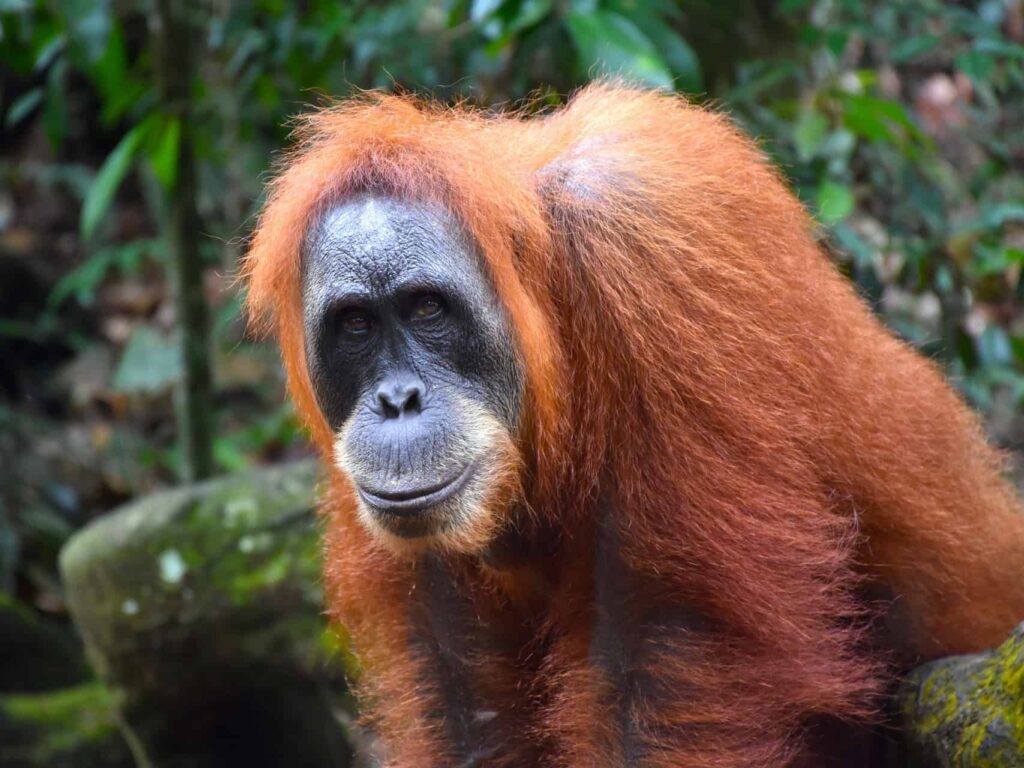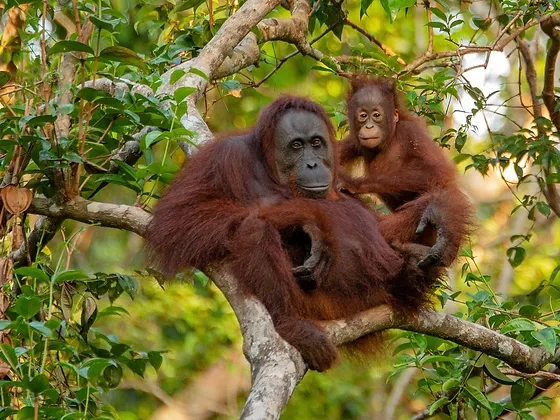Orangutans: Deforestation’s Impact
Introduction:
Orangutans, the only great apes found outside of Africa, are renowned for their intelligence, empathy, and unique characteristics. However, these majestic creatures face a grave threat: deforestation. As the lush rainforests of Southeast Asia are cleared at an alarming rate, orangutans are losing their natural habitats, pushing them towards the brink of extinction. This article delves into the profound impact of deforestation on orangutans, highlighting the ecological, social, and ethical consequences of this ongoing crisis.

Taxonomic classification:
Orangutans belong to the taxonomic classification of the great apes, which are part of the family Hominidae and the subfamily Ponginae. Their scientific classification is as follows:
Kingdom: Animalia
Phylum: Chordata
Class: Mammalia
Order: Primates
Family: Hominidae
Subfamily: Ponginae
Genus: Pongo
Species: There are three species of orangutans:
- Pongo abelii – Sumatran orangutan
- Pongo pygmaeus – Bornean orangutan
- Pongo tapanuliensis – Tapanuli orangutan (recently identified as a separate species)
Understanding Orangutans:
Orangutans, with their distinctive red fur and expressive faces, are native to the rainforests of Borneo and Sumatra. They are highly intelligent beings, capable of using tools, displaying complex social behaviors, and exhibiting a remarkable level of self-awareness. These arboreal primates play a crucial role in their ecosystems as seed dispersers, contributing to the health and diversity of the forest.

Lifespan:
The lifespan of orangutans varies depending on factors such as species, habitat, and individual health. In general, orangutans have relatively long lifespans compared to many other primates.
Sumatran orangutans (Pongo abelii) tend to have a slightly shorter lifespan compared to Bornean orangutans (Pongo pygmaeus). On average, orangutans in the wild live to be around 30 to 45 years old. However, in captivity, where they receive regular veterinary care and protection from predators and other threats, orangutans can live significantly longer. Some individuals have been known to live into their 50s or even 60s in captivity.
Deforestation and Its Causes:
Deforestation in orangutan habitats primarily stems from agricultural expansion, particularly for palm oil plantations. The demand for palm oil, a versatile vegetable oil used in numerous products, has led to extensive clearing of rainforests, depriving orangutans of their homes. Logging, mining, and infrastructure development further exacerbate habitat loss, fragmenting forested areas and isolating orangutan populations.

Impact on Orangutans:
The consequences of deforestation on orangutans are dire. Loss of habitat forces these primates into smaller and increasingly fragmented areas, leading to competition for resources and conflicts with humans. Orangutans face threats such as poaching, human-wildlife conflict, and disease transmission as their habitats shrink. Moreover, deforestation disrupts their natural behaviors, affecting mating patterns, foraging habits, and social dynamics.
Conservation status:
The conservation status of orangutans varies depending on the species. As of the most recent assessments, conducted by the International Union for Conservation of Nature (IUCN), all three species of orangutans are classified as critically endangered. This is the highest risk category assigned by the IUCN Red List of Threatened Species, indicating that orangutans face an extremely high risk of extinction in the wild.
Population:
The total population of wild Bornean orangutans is estimated to be approximately 70,000-100,000 individuals. On Sumatra, the orangutan population is approximately 13,800 individuals. The Tapanuli orangutan populations is approximately 800 individuals (2024).
Ecological Ramifications:
The decline of orangutan populations due to deforestation has far-reaching ecological implications. Orangutans play a crucial role in maintaining the health of rainforests by dispersing seeds and facilitating plant regeneration. Their disappearance could disrupt forest ecosystems, leading to reduced biodiversity, altered carbon cycles, and increased vulnerability to climate change. The loss of orangutans could trigger a cascade of ecological imbalances, impacting countless other species and ecosystems.
Conservation Efforts:
Efforts to conserve orangutans and their habitats are underway, led by governments, NGOs, and local communities. Conservation initiatives focus on habitat protection, reforestation, community engagement, and sustainable land-use practices. Establishing protected areas, implementing land-use planning, and promoting responsible consumer choices regarding palm oil are crucial steps in safeguarding orangutan habitats and securing their future.

Challenges and Solutions:
Despite conservation efforts, orangutans continue to face numerous challenges. Illegal logging, land encroachment, and weak law enforcement pose significant obstacles to conservation efforts. Addressing these challenges requires collaborative action at local, national, and international levels. Strengthening enforcement of environmental laws, supporting sustainable livelihoods for local communities, and promoting eco-tourism are vital strategies for mitigating the impacts of deforestation on orangutans.
The Role of Awareness:
Raising awareness about the plight of orangutans and the consequences of deforestation is paramount. Education campaigns, documentaries, and social media advocacy can mobilize public support and pressure governments and corporations to adopt sustainable practices. Consumer awareness regarding the products they use and the companies they support can influence market trends and encourage the adoption of deforestation-free supply chains.
Conclusion:
Orangutans are emblematic of the profound impact of deforestation on biodiversity and ecosystem health. Their survival is intrinsically linked to the preservation of rainforests, making their conservation a global priority. By addressing the root causes of deforestation, promoting sustainable development, and fostering coexistence between humans and orangutans, we can ensure a future where these iconic primates continue to thrive in their natural habitats. It’s not just the fate of orangutans at stake; it’s the future of our planet’s biodiversity and the well-being of generations to come.
9 thoughts on “Orangutans: Deforestation’s Impact”
I am genuinely amazed with your profound understanding and stellar way of expressing complex ideas. Your depth of knowledge shines through in every sentence. It’s clear that you spend considerable time into understanding your topics, and that effort is well-appreciated. Thank you for sharing such valuable insights. Keep up the great work! https://www.elevenviral.com
I’m thoroughly captivated by the keen analysis and superb way of expressing complex ideas. Your depth of knowledge shines through in every sentence. It’s evident that you invest a great deal of effort into delving into your topics, and this effort pays off. Thank you for sharing this valuable knowledge. Keep up the great work! https://www.elevenviral.com
I’m truly impressed by your profound understanding and stellar way of expressing complex ideas. The knowledge you share is evident in each paragraph. It’s evident that you invest a great deal of effort into delving into your topics, and the results pays off. We appreciate your efforts in sharing this valuable knowledge. Keep up the great work! https://www.elevenviral.com
I’m thoroughly captivated by the keen analysis and superb ability to convey information. Your expertise clearly stands out in each paragraph. It’s evident that you put a lot of effort into understanding your topics, and that effort pays off. Thank you for sharing such valuable insights. Keep up the great work! https://www.elevenviral.com
I’m truly impressed by your profound understanding and stellar way of expressing complex ideas. Your depth of knowledge shines through in every sentence. It’s obvious that you put a lot of effort into delving into your topics, and that effort pays off. We appreciate your efforts in sharing this valuable knowledge. Keep on enlightening us! https://rochellemaize.com
I appreciate the step-by-step approach.
I have noticed that costs for on-line degree gurus tend to be a terrific value. Like a full Bachelor’s Degree in Communication in the University of Phoenix Online consists of 60 credits with $515/credit or $30,900. Also American Intercontinental University Online comes with a Bachelors of Business Administration with a full education course feature of 180 units and a cost of $30,560. Online learning has made getting the higher education degree so much easier because you may earn your current degree from the comfort in your home and when you finish working. Thanks for all other tips I have learned through the blog.
Great piece here! It was very educational. Visit us at https://thefoundationkings.com/ for all your foundation needs.
There are actually plenty of details like that to take into consideration. That could be a nice point to bring up. I provide the thoughts above as common inspiration but clearly there are questions like the one you convey up where an important factor will likely be working in trustworthy good faith. I don?t know if greatest practices have emerged round issues like that, however I’m positive that your job is clearly identified as a good game. Each girls and boys really feel the influence of only a second’s pleasure, for the remainder of their lives.